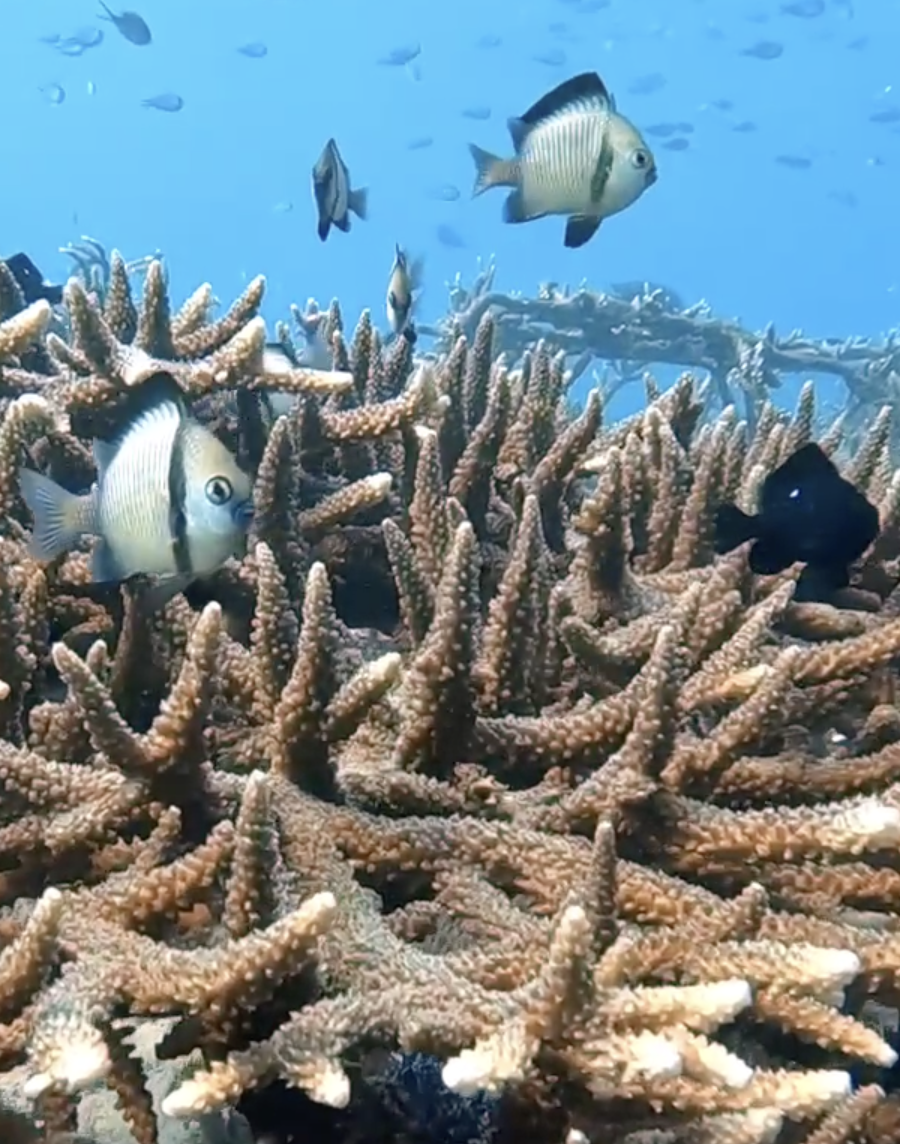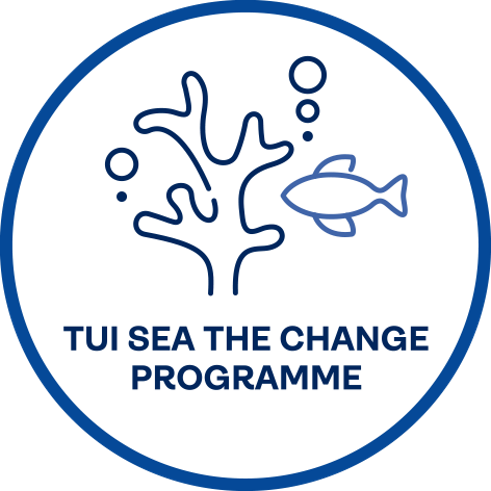Rebuilding a reef in Padangbai.
Livingseas Coral Restoration Site lies just outside the harbor of Padangbai, East Bali. This is the largest coral reef project on the island and it is open to everyone! Learn about coral reefs, conservation, and the ocean and take part in a real and hands-on sustainable experience.
Coral reefs are the "rainforests of the sea".
Reefs are one of the most fascinating natural environments on earth. Much like the rainforest, they build the base layer for a multitude of life forms. 25% of all marine life can be found in these nurseries of the ocean. Coral reefs offer the perfect habitat, breeding ground, shelter and food for smaller marine animals. Bigger fish depend on the reef in return as a food source - no reef, no sharks! Due to the reef's location in coastal areas, it protects the shoreline. Local fisheries depend on it. And it offers fun recreational experiences in the form of snorkeling or diving!

Visit the largest reef restoration site in Bali.
Join the action with REEF RESTORATION BALI and rebuild a coral reef in Padangbai! Become an ocean warrior and get involved. Build your piece of new reef, above or underwater. We offer amazing and sustainable activities all around the coral reef, from coral workshops to snorkeling or dive tours. Our reef restoration site is open 24/7 and our programs are suitable for all ages. We offer half or full-day packages for individual visitors, school groups, corporate outings or families and friends. Book a Coral Restoration Snorkel Tour, a Coral Workshop, or a Coral Restoration UW-package today!
Help build a new coral reef.
Are you an ocean enthusiast who wants to contribute to rebuilding a healthy ecosystem and increasing biodiversity? Do you want your children to learn about the ocean and the reef whilst having fun? Are you looking for an interesting environment to not only experience but contribute to ocean conservation? Then you have come to the right place. Sign up for a Coral Restoration Snorkel Tour, a Coral Workshop or a Coral Restoration Underwater Package and get ready for a unique and amazing eco-activity.
Embark on an unforgettable adventure.
Coral Restoration Snorkel Tour
Join us on a floating pontoon to learn coral restoration techniques and help revive fragile reefs. After planting, enjoy an exciting snorkeling tour to explore the vibrant marine life your efforts support. Perfect for families, young adventurers, ocean lovers, and eco-tourists!
An inspiring day of reef conservation.
Coral Workshops
Looking for a meaningful and sustainable activity for you and your employees, your family or friends? Do something extraordinary and make a real impact: Our Coral Workshops for groups (min. 10 people) offer a unique experience in coral conservation and reef restoration.
Dive right into coral reef restoration.
Coral Conservation UW
Dive into conservation with our "Coral Conservation UW" package, perfect for certified divers and curious beginners alike! This two-tank dive package includes two restoration dives where you contribute to building a new coral reef. Additionally, you have the chance to witness the remarkable biodiversity that the reef supports. If you are new to diving, you will be guided by a personal dive instructor and learn all about corals while getting comfortable in the water. But no matter if you are an experienced diver or not, you will have an unforgettable experience that makes a positive impact on the ocean!
How does coral reef restoration work?
-
What are reef stars?
Reef stars are metal structures coated with sand that we use to attach coral fragments. They serve as a stable substrate where corals can securely attach and thrive, away from the sand and in the currents where they can receive the necessary nutrients and sunlight.
-
Why do we need a structure in the first place?
If there is no support structure for corals, sand from the seabed can cover their flesh. This prevents them from accessing sunlight and nutrients that they require to survive. Corals have a preferred side which they face towards the sun, much like leaves. In the absence of a support structure, they may roll around on the sand and ultimately die.
-
Where do we get the corals from?
We are very lucky here in Padangbai to still have numerous natural coral sites with a diverse range of coral species. We harvest broken corals from these sites and relocate them to our restoration area, providing them with a fresh start! We also cultivate multiple corals in our coral nurseries to minimize the need to harvest natural corals in the future.
-
How do corals get "planted"?
To securely attach a total of up to 18 coral fragments onto the reef star, we use two cable ties - one at each end of the coral. It's important to ensure that the correct side of the coral is facing the sun. The attachment needs to be tight to allow the coral to permanently attach onto the structure and grow strong.
-
How is the reef constructed starting from a coral workshop onshore?
Once all coral pieces are attached to the reef star, we will proceed to lower it onto the reef. A member of the Livingseas team will then construct the reef by interlocking the legs of the reef stars, adding your contribution to the beautiful growing reef down below!
-
How is the reef built underwater whilst diving?
First, a member of our team submerges the reef stars from the boat and anchors them on the seabed to ensure safety. Then, we attach the coral pieces to the reef stars without the need to remove them from the water. This setup differs from others as the order of the process is reversed, but the process itself remains the same.
-
How long does it take for the coral to grow?
Imagine how amazing your corals will look in just one year's time, when they will have grown to be bigger than your hand. In two years, they will continue to grow and provide a home for many other sea creatures on the reef. After three years, you can't even tell that this coral was planted - it will look totally natural!
We have lost half of all coral reefs since 1950.
More than half of the world's coral reefs have disappeared in the last 70 years. Human activities such as unsustainable fishing methods like dynamite fishing, increasing ocean temperatures that lead to coral bleaching, pollution, ocean acidification, and the harmful effects of tourism have caused significant harm to these reefs over the past few decades. Unfortunately, things are not improving, and experts predict that by 2050, there could be more plastic than fish in our oceans.
We often get asked "What else can I do?" to fight climate change, support biodiversity, and make a difference. Here are some suggestions:
-
Dive or snorkel with care. Being in the water is exciting, but watch out with your fins not to damage the reef by accident.
-
Use reef-safe sunscreen. Avoid using sunscreens with chemicals. Use water-resistant mineral-based sunscreens instead.
-
Support the reef. Livingseas Foundation offers a range of donation opportunities - all proceeds go directly into the ocean, literally!
-
Live sustainably. Small changes in one's behavior have a big impact. Shop local, avoid palm oil and eat less meat and dairy.
-
Avoid single-use plastics. It can take up to 500 years for that plastic fork to decompose - better bring your own one in the first place!


The unique Coral Snorkel Tours are a part of "TUI Sea The Change, Bali" - an initiative of the TUI Care Foundation in partnership with Livingseas Foundation.
TUI Sea the Change, Bali is a marine conservation project in collaboration with TUI Care Foundation and Livingseas Foundation. The project promotes sustainable tourism by offering an opportunity for everyone, from local students to tourists, to participate in coral reef restoration.


